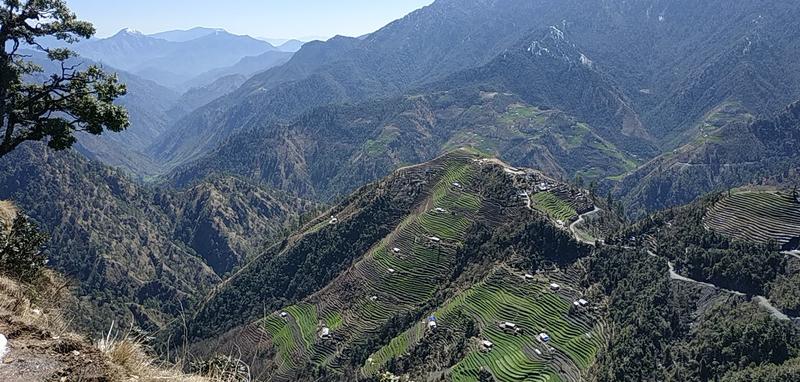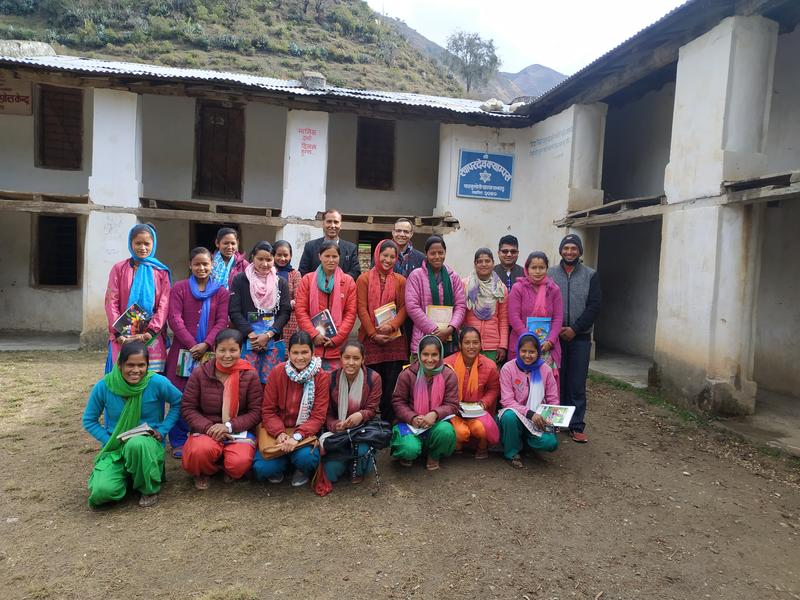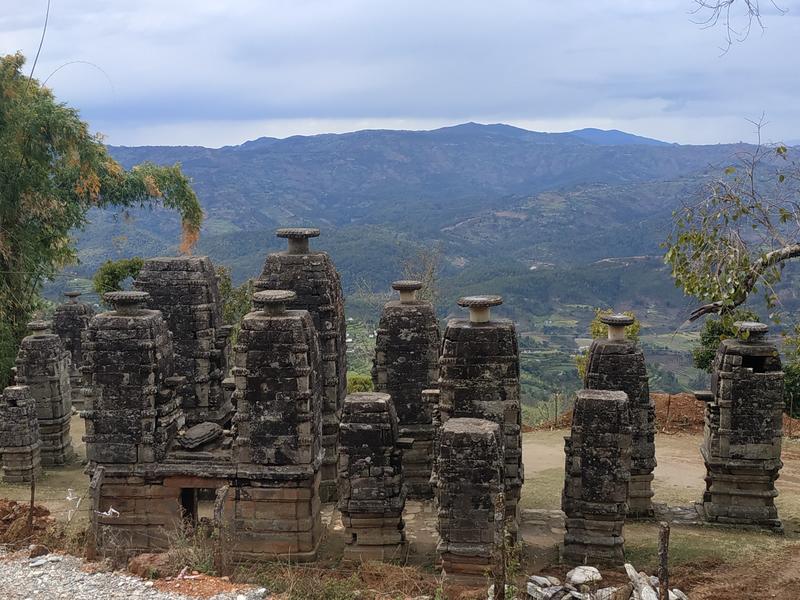The Dalit Search for Dignity: State, Society, and Mobilization from Below in Far West Nepal
Funded by the British Academy through its Heritage, Dignity and Violence Programme (GCRF) (Nov 2019 – May 2023), this project aims to study from below the whole range of Dalit experience and whether, how far, and for whom the label ‘Dalit’ is viable. The project follows on from, and will apply some of the methodological tools and lessons from, the ESRC-funded Caste, Class, and Culture project based in Kaski district. That project studied Dalit life in the context of the local society, i.e. the focus was on livelihoods, migration, culture, generational change, and changing inter-relationships and dependencies of all local groups - Dalits, Chhetris, Bahuns, and Janajatis alike.
Nepal’s Dalits (ex-Untouchables, population nearly 3.5 million) remain at the bottom of society by all measures despite huge changes in the last 50 years. The possibility of building on their artisan and artistic heritage is compromised by pervasive stigma; they continue to face discrimination and at times violence. Building on earlier research, this project brings together a highly experienced interdisciplinary team, including Dalit scholars, to investigate the experience of Dalitness in the Mid and Far West Nepal, the poorest and most conservative part of the country. Research methods will include surveys, focus groups, interviews, participant observation, historical and literary analyses. The aim is to understand from below the position of Dalits, and how far mobilization for dignity under the label ‘Dalit’ is viable. The research is designed to inform policies of decentralized local governments, newly empowered under the federal republican constitution, and thereby contribute to peace, inclusion, and equity.

Terraced fields in Baitadi (K.P. Adhikari, 2020)
| Research Team | Partner Organizations | Project Advisors |
| DG: David Gellner (Oxford); | Prithvi Narayan Campus, TU, Nepal; |
Joanna Pfaff-Czarnecka |
| KA: Krishna Adhikari (Oxford); | RSDC: Rural Self-reliance Development Centre; |
Dhana Bhusal (Save the Children Surkhet, Nepal). |
| BKP: Biswa Kallyan Parajuli (PN/TU); | SF: Samata Foundation. | |
| AC: Anchala Chaudhuri (PN/TU); | ||
| TB: Tilak Bishwakarma (RR/TU); | ||
| GN: Gopal Nepali (Samata); | ||
| PN: Prakash Nepali (Samata); | ||
| MH: Michael Hutt (SOAS); | ||
|
BM: Basanta Maharjan (freelance). |

BA students and their teachers with KA and GN at Khapardev Campus, Kalukheti, Bajhang district (2020)
In addition to the main survey and interview work in four different sites in Mid and Far West Nepal, there will be ten additional specialized work packages (SWP1–10) that will, taken together, provide a rounded interdisciplinary approach to the problem. The material for the first seven SWPs will be collected primarily through interviews and focus groups; the other three SWPs will be based primarily on written sources. All will look at local perceptions, resistance, and mobilization in relation to Dalit identity and dignity.
SWP1: Cultural heritage, skills, and occupational changes and social respectability of Dalits (BKP, AC, with KA).
SWP2: Sexual taboos and Badi women’s mobilization for dignity (AC, GN, BKP).
SWP3: Intercaste marriages involving Dalits in practice and in policy (TB).
SWP4: The menstrual impurity of women and girls: Chhaupadi practice and resistance (AC with BKP).
SWP5: Relations of dependence: Ploughmen (Haliya) and patrons (BKP with AC).
SWP6: Cooperatives and political participation: How far do women and Dalits get involved? (RSDC with KA).
SWP7: Dalits in the school curriculum (KA, GN).
SWP8: Representations of Dalits in Nepali literature, with special reference to West Nepal (MH).
SWP9: Dalits in the historical record (BM).
SWP10: Local impacts of reservation policies (SF, GN).
With the help and sponsorship of the project, the Far Western University will hold its first international conference of 'Far Western Studies' (Sudurpaschim Studies: Heritage, Innovation and Transformation) from the 12th to 14th December 2022. Please visit the conference website for details.

Twenty-two medieval temples ('devals') in Bhurti, Dailekh district (K.P. Adhikari, 2020)
Publications
Adhikari, K.P. (ed.) 2023. Research Summary- Policy Paper: The Dalit Search for Dignity: State, Society, and Mobilization from Below in Far West Nepal. Issue 1. (English version and Nepali version)
Adhikari, K.P. and Gellner, D.N. 2023b. 'Two Steps Forward, One Step Back: Dalit Experiences of Primary and Secondary Education in West-Central Nepal', in K. Valentin & U. Pradhan (eds), Educational Transformation and Avenues of Learning: Anthropological Perspectives on Education in Nepal. Delhi: OUP, pp. 103-134.
Chaudhary, A. 2023. 'The Menstrual Impurity of Women and Girls: Chhaupadi Practice and Resistance' Asian Journal of Population Sciences 2(1), 90–106.
Adhikari, K.P. 2023. 'Story: Swarga Jane Bato' [Pathways to Heaven]. Shikshak (June-July 2023).
Bishwakarma, T. 2023. 'Shahakariko Ujyalo Pato' [The Bright-sides of Cooperatives.] Himal Khabarpatrika.
Gyanwali, S. & Nepali, G. 2023. 'Dalitko Den, Ahimsatmak Andolan' [Dalits’ Contribution: Non-Violent Struggle]. Himal Khabarpatrika (Vaishak 2023).
Nepali, G.N. 2022. 'Maile je Sahe' [What I tolerated]. Himalkhabar Shrawan 2022 (17 July 2022).
Nepali, G.N. and Sundas, U. 2022. 'Isthaniya Nirvachan ra Samaveshitako Sandarbhikata' [Local government elections and their relevance to the inclusion]. Nepalganj News (7 April 2022).
Bishwakarma, T.2022. 'Dalitka Lagi Dharma Nirapekshyata: Uhi Sashak Ustai Dalan' [Secularism for Dalits: The same ruler, similar oppression]. Himal Khabarpatrika (9 Jan 2022).
Bishwakarma, T. 2021. 'Jagga Nahuda Rajyale Banayo Anagarik' [Statelessness due to landlessness]. Himal Khabarpatrika (8 Sept 2021).
Gellner, D.N., Adhikari, K.P. & B.K., A.B. 2021. Dalits in Search of Inclusion: Comparing Nepal with India, in A.S. Rathore (ed.) B.R. Ambedkar: The Quest for Social Justice, Vol. 2: Social Justice. Delhi: OUP (pp 91-115).
Nepali, G., Sundas, U., Adhikari, K.P. 2021. ‘Kovid-19 le Dalit Samudayama Pareko Prabhav Adhyayan Prativedan 2077'. [The Impact of Covid-19 on Dalit Communities: A Study Report 2021.] (Ed. A. Bishwakarma). Kathmandu: Samata Foundation.
Bishwakarma, T. 2021. ‘Dalit Mahilasanga Vivah Garera ‘Bituliyeka’ yi Bitalu- Jaslai Samajle Dalit Thanchha, ani Kanun Beglai’ [This Bitualu ‘Polluted’ by Marrying a Dalit Woman whom the Society Regards as Dalit but Law Applies Differently]. Himal Khabar, 1 June 2021.
Nepali, G. 2021.'Badi Awaj: Itihas Apaharangari ‘Dehvyaapari’ Banaiyo' [Badi’s Voice: History was Hijacked to Label them ‘Prostitute’.]. Nayapatrika, 9 Jan. 2021.
Gellner, D.N., Adhikari, K.P. 2020. 'Guarding the Guards: Education, Corruption, and Nepal’s Commission for the Investigation of Abuse of Authority (CIAA)' in Public Anthropologist, 2 (1) 177-200. (Open access at: https://brill.com/view/journals/puan/2/2/article-p177_177.xml).
Nepali. G. 2020. Anusandhanle Achammai Paryo. [The Research Findings were Startling]. Sikshapatra, 5 Oct. 2020.
Nepali, G., Koirala, S. 2020. Chhuvachhutmukta Rastrama Anatrjatiya Prem Kina Varjit? [Why is Inter-caste Marriage Banned in a Country that is Declared free from Caste-based Untouchability?] Nayapatrika, 30 May 2020.
Nepali, G. and Adhikari, K. P. 2020. Aranmai Astaeka Gumnam Vaigyanik [A Forgotten Scientist who Breathed Last in his Workshop] Nayapatrika Daily, 21 March 2020.
Media
Interview with Tilak Bishwakarma on Dalit-non-Dalit Inter-caste Marriage by Actor Rajesh Hamal, on ‘Jatko Prasna’ [Questions of Caste] for Kantipur Television, Episode 7. 13 Sept. 2020.
Link to project blog: https://samatafoundation.org/dalit-search-for-dignity-blogs/



